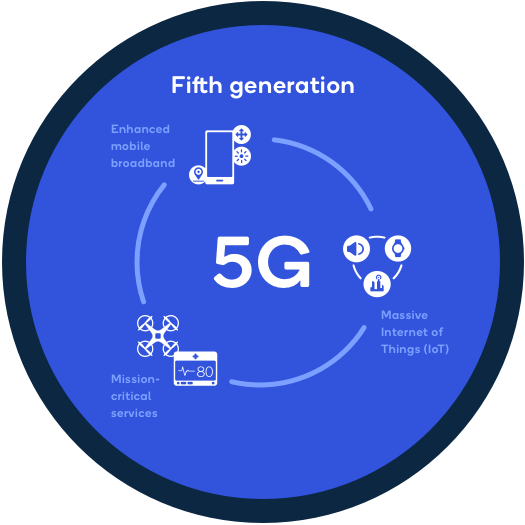Aytyapi Insights
Exploring the latest trends and updates in technology and lifestyle.
5G: The Fast Lane of Connectivity Madness
Unleash the power of 5G! Discover how this lightning-fast connectivity is changing our world and what it means for your future.
What is 5G and How Does it Revolutionize Connectivity?
5G, or fifth-generation technology, represents the latest evolution in mobile networks, designed to significantly enhance connectivity compared to its predecessors. This technology offers faster speeds, lower latency, and the ability to connect a vast number of devices simultaneously. With download speeds potentially reaching up to 10 Gbps, 5G enables seamless streaming of high-definition content, supports real-time gaming, and facilitates advanced applications like augmented reality (AR) and virtual reality (VR).
The impact of 5G goes beyond mere speed; it also introduces a paradigm shift in how devices communicate with each other. With its ability to connect up to one million devices per square kilometer, this technology revolutionizes the Internet of Things (IoT), paving the way for smarter cities, autonomous vehicles, and improved healthcare solutions. By reducing latency to as low as one millisecond, 5G facilitates instantaneous communication, which is crucial for applications that rely on real-time decision-making.

The Benefits of 5G: How It Will Change Our Daily Lives
The advent of 5G technology promises to revolutionize our daily lives in numerous ways. One of the most significant benefits is the increased speed and reliability of mobile internet connections. With download speeds up to 100 times faster than 4G, activities such as streaming high-definition videos, video conferencing, and online gaming will become seamless experiences. Imagine downloading a full-length movie in just a few seconds or enjoying lag-free gaming sessions with friends across the globe. This enhancement in connectivity will not only benefit individual consumers but also empower businesses to innovate and enhance their services.
Moreover, 5G will enable the growth of the Internet of Things (IoT), connecting billions of devices to the internet, from smart home appliances to wearables. This level of interconnectivity will lead to smarter cities where traffic lights, public transportation, and emergency services communicate with each other in real-time to improve efficiency and safety. For example, 5G technology will allow for real-time traffic data analysis, resulting in optimized route planning and reduced congestion. As we continue to embrace 5G, our daily routines will evolve to be more efficient, connected, and enriched, ushering in a new era of technological advancement.
Common Myths About 5G You Need to Stop Believing
As 5G technology continues to roll out worldwide, various myths and misconceptions have surfaced, leading to confusion among consumers. One common myth is that 5G will cause severe health problems due to its use of higher-frequency radio waves. However, research from multiple health organizations, including the World Health Organization (WHO), indicates that 5G frequencies are well within safe limits and are not significantly different from previous cellular generations. This misconception can cause unnecessary anxiety, but it is crucial to rely on credible information rather than unfounded fears.
Another prevalent myth surrounding 5G is that it will make Wi-Fi and other wireless technologies obsolete. While 5G does offer faster internet speeds and lower latency, it is designed to complement existing technologies rather than replace them entirely. For instance, Wi-Fi networks will still play an essential role in local connectivity, especially in homes and businesses. Instead of believing that 5G will eliminate Wi-Fi, consider it as an enhancement that provides improved performance and connectivity options across a variety of devices.